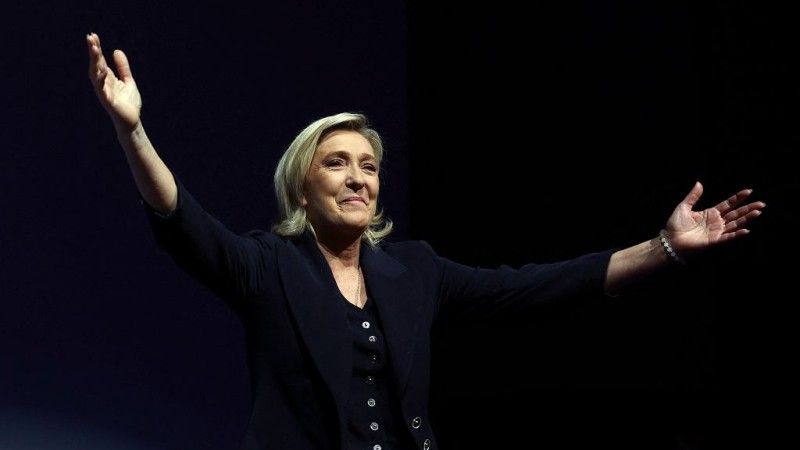Geopolitics
Macron’s Gambit and Le Pen’s Dominance: France Chooses Change

Although France may impress on the international stage, its internal situation, including rising crime, illegal migration, and economic stagnation, has led the French to desire change. The alternative is the strong right wing. The alternative is Marine Le Pen and the National Rally (RN).
A nuclear power, the strongest army in the European Union, the largest exclusive economic zone, troops around the world, and a strong economy—France certainly can impress on the international stage. It has managed to develop strong cooperation with Africa, establish a presence in Central Asia, and simultaneously strengthen its fleet in the Indo-Pacific. At the same time, it has become the second-largest arms supplier in the world, and French companies are entering new markets, including the Ukrainian market. These are all tremendous assets, but the French have expected the authorities to finally pay attention to the internal situation. Terrorist attacks, rising crime, illegal migration, lack of pension reform, a neglected healthcare system and teachers, along with rising prices—these issues have driven the French to seek an alternative. That alternative, at the moment, is Marine Le Pen and the National Rally (RN).
The campaign, following the European Parliament elections and the dissolution of the National Assembly, lasted only three weeks. The National Rally not only did not weaken but further mobilized its electorate. Opposing them were many now-inactive politicians, athletes (led by football players currently playing in the Euros; just before the match against Belgium), artists, and foreign politicians supporting Macron. With a turnout of 66.71% (an increase of 19% compared to 2022), the parties achieved the following results:
- National Rally (Rassemblement National – 29.25%) + Ciotti's Republicans (LR-Ciotti – 3.9%): 33.14%;
- United Left (New Popular Front; Nouveau Front Populaire): 27.99%;
- Presidential camp "Ensemble": 20.83%;
- Republicans (Les Républicains – 6.57%) and allied center-right: 10.23%.
The second round of elections is on July 7. Currently, the contest is not about ensuring a victory for the Left or President Macron’s party. The priority now is to prevent Marine Le Pen’s camp from gaining an absolute majority. With 577 seats in the National Assembly (Assemblée Nationale), it is realistic for the National Rally to secure between 225 and 295 seats. The crucial threshold would be 289 seats, which would allow them to dominate parliament. For now, the Left and the presidential camp are mobilizing against the National Rally, giving up spots on lists and publishing appeals in the media to combat Marine Le Pen’s party. As the past three weeks have shown, such calls only further mobilize the far-right electorate. In any scenario, France faces changes.
No Exit from NATO, Domestic Policy Dominates
The dominance of Marine Le Pen’s party is not due to Paris’s support for Ukraine, reduced presence in Africa, or severed relations with Russia. These are significant elements of foreign policy, but for the French, there were many more factors that tipped the scales. This primarily concerns domestic policy.
The persistent threat of terrorism and the risk of further attacks have left a mark on the country’s situation. Demonstrations, property destruction, looting, and rising crime became regular occurrences. Nearly a million illegal migrants, difficulties in deportation, limited control over many accused of crimes, lack of transparency in the residence and asylum permit process, and the fiction of the enacted immigration law exacerbated the issue.
At the same time, over the past two years, there has been insufficient attention to pension reform, which France urgently needs. The healthcare system and teachers were neglected, despite their expectations for consultations and changes. With rising prices, fears of greater internal polarization (such as clashes between pro-Palestinian and pro-Israeli groups, which occurred hundreds of times in recent months, and ongoing Islamic extremism), and inefficacy in implementing promised citizen security policies, the evolution was inevitable.
The French expect internal changes. The issue of NATO membership is not up for discussion. France is in NATO, and it will remain in NATO. There will be no troop withdrawals from Estonia, and multi-million dollar arms contracts will be fulfilled. The key issue is the internal situation and changes within the country that will redefine immigration policy, funding for agriculture, healthcare, education, and cooperation within the European Union. The National Rally is seen as the new quality that a third of the French people expect. This is all about addressing the needs of citizens who have previously voted for socialists, republicans, centrists, and the left. Now, the majority is leaning towards the strong right.
Perspective for Poland
With one week remaining until the second round of elections, the political scene is heating up not only in France but around the world. Concerns are growing about the National Rally’s (RN) ties with the Kremlin. While it is true that this relationship exists and should be considered, Macron remains the president (with authority over the armed forces and foreign policy) for another three years. Additionally, in parliament, the RN will face opposition from both the Left and the presidential camp. A victory for Marine Le Pen does not mean that France will resume close relations with Russia. In fact, France maintained significant cooperation with Russia even under Macron’s presidency. Macron’s recent shift in stance has only been noticed lately (let’s recall the beginning of the war), as Paris has always approached foreign policy pragmatically and without romanticism.
For Poland, cooperation with France should remain a priority. Turning away from the RN, if it achieves a strong result, could be detrimental to Central and Eastern European countries. Russian issues were neither a primary nor secondary focus during the campaign, and this should be capitalized on. A Paris closely allied with Warsaw is a Paris distanced from Moscow. Currently, the focus is on supporting Ukraine, where decisions about arms deliveries will be made by the Prime Minister and the Minister of Defence. This also includes establishing a united front against Russia, with the Baltic countries and Poland speaking with one voice. It is crucial to adapt to the new situation while keeping in mind the need for French engagement on the eastern flank.
Nothing is yet decided, and the most significant changes in the near future will occur not in France (which few in Poland currently expect to lead in security matters) but in the USA. The election of the National Rally signals that expectations of governance are changing and national interests are becoming dominant. Democracy has prevailed. Over the years, Paris has made various decisions, especially on the international stage. This time, we must allow France to be France, which indeed needs to address its internal issues. Sunday’s results and reactions can be summarized in one sentence: Never before has democracy in France waged war against democracy.”
